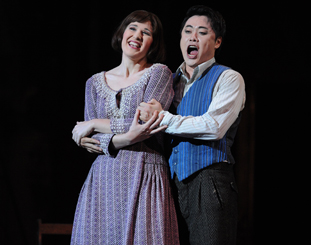Concert Review: Hotheads and Lovers/ Castalia Vocal Consort
Hotheads and Lovers
Castalia Vocal Consort
aMBUSH Gallery, Waterloo
12 February 2022
Newly formed vocal consort Castalia, assuredly led by joint artistic directors Amy Moore and Stephanie Dillon, breathes fresh life and vigour into the Australian musical landscape in their debut performance featuring twenty-one vocal pieces from solos to 6-part madrigals and two instrumental works for theorbo/lute written by composers from 14th century Italian to contemporary American and notably featuring outstanding works by four female composers.
Together, sopranos Chloe Lankshear and Amy Moore, mezzo-soprano Stephanie Dillon, tenors Christopher Watson and Louis Hurley and bass Philip Murray with Simon Martyn-Ellis playing theorbo and lute, meticulously revealed a treasure chest of sparkling musical jewels, as each carefully curated song explored the colours and myriad emotions of which human voices are capable.
Each singer brought a command of bel canto technique that produced effortless ease of delivery, pitching and dynamics. The individual singing and excellence of ensemble was such as might be dreamt of in Europe, yet here, the audience on a damp Saturday afternoon in a petite modern gallery space in Waterloo were taken majestically to somewhere magical, transcending both time and place.
The synergy of voices was evident from the outset as their first bracket Dolcissimi (Sweetness) embraced works by the Renaissance masters Arcadelt, Gesualdo, Barbara Strozzi and a masterpiece by Claudio Monteverdi, Si ch’io vorrei morire. This astonishing work delivered all of the delightful erotic nuance for which the finest madrigals are renowned, complete with orgasmic sighs and breathless rhythmic excitement. All part-songs written for four to six voices, with some accompanied by theorbo, this opening bracket allowed the ensemble to shine in masterworks of the Golden Age of the 16th century Italian madrigal.
A short instrumental chaconne from Simon Martyn-Ellis deliciously acted as a sorbet might in a rich meal, refreshing the palate and preparing the audience for the next course. A highlight of the beautifully constructed and varied programme was the duet in the following group Primavera (Spring). Scored for two tenors, Landini’s Ecco la primavera is a work from the 14th century. It was as if a time machine miraculously transported the listener to a medieval world no less magnificent but quite different to the lush Renaissance counterpoints of the opening bracket. Tenors Christopher Watson and Louis Hurley relished their moment in the spotlight, delivering lively interplay and ravishing vocal tone and expression.
The acoustic of the gallery space added just the right amount of reverberation, so a steadier tempo in Monteverdi’s Io mi son giovinetta might allow for clearer melismatic articulation. The exuberance however perfectly matched the text which celebrates the laughter of a young girl in the springtime of life.
The first of the fine solos was perfectly placed to showcase the velvety tone of mezzo-soprano Stephanie Dillon. All three songs in the bracket Augelli (Birds) were works by female composers. Maddalena Casulana flourished in the progressive republic of Venice at a time when few women were recognised as creative artists. She was a singer, published composer and lutenist of note, but her works are much lesser known than her male counterparts. Castalia do a great service by programming her music and that of Settimia Caccini, daughter of the great Giulio Caccini. A renowned singer, sadly her works were not published in her lifetime and likely many were lost. Amy Moore channelled her both as performer and composer superbly, in this solo with theorbo, expressing the essence of the 17th century’s “new music” where the madrigal’s elaborate counterpoint was eschewed for the expressive operatic possibilities of a solo voice.
These two works were the ideal entrée to the concert’s luminous and magnificent centrepiece – contemporary American composer Caroline Shaw’s Dolce Cantavi.
This work was a revelation. Shaw famously was awarded a Pulitzer Prize in 2013 aged 30 for her groundbreaking Partita for 8 voices. The three female voices of the group, Chloe Lankshear, Amy Moore and Stephanie Dillon revisited the brilliance of the virtuosic Tre donne of Monteverdi’s time to deliver an exquisite and breathtaking performance of this work in which birdsong is savoured, imitated, and transcended in turn with conventional harmonies being delightfully subverted by surprise harmonic twists at the end of phrases. A technique mastered by Carlo Gesualdo – it is reinvented by Caroline Shaw in this shimmering jewel.
The next two brackets explored darker emotions Crudelta (Cruelty) and Infiammare (Inflamed passion). The ensemble relished the operatic theatricality of D’India’s Se tu Silvio crudel. With seemingly boundless ambition they followed this with one of the most musically challenging works of Gesualdo’s output Merce! Grido Piangendo.
Few ensembles truly master the difficulties of the more complex Gesualdo madrigals. Although a newly formed group, Castalia mounted the Everest of Gesualdo’s troubled and disturbingly modern mind with surety and impressive accuracy of pitch and delivery of the quixotic changes of affect.
After the surprising dissonance of Gesualdo’s time-bending forays into chromaticism the two contemporary works of Sciarrino and Finnissy came as less of an auditory shock. It was wonderful to hear the ensemble explore more contemporary technical extensions, portamenti and insect like tongue whirring in Rosso, then the virtuosic maximalist coloratura in Finnissy’s soprano battle Quel “no”. The latter invoked echoes of Mozart’s Impresario, as if two modern queens of the night were locked in a duel of vocal fiery gymnastics. While impressive, this work sat less easily among the works of stile antico, but certainly brilliantly showcased the skills of the soprani.
Returning to a masterly work of Monteverdi, Rimanti in pace brought the concert full circle back to its core configuration – the madrigal in 5 voices in a work of great emotional depth. The lamenting melodic falls might melt the most hardened heart, transporting it musically through an intensity of grief to sobbing, tearful release.
It was a brave but inspired decision to end the recital with songs of great melancholy. The last utterance, Verdelot’s Ulitimi miei sospiri (My final sighs) was perfectly apt to complete this transcending experience. The luminous soprano of Chloe Lankshear entreated the audience and performers alike –“O infinite beauty, from your faithful one pitiless suffering chases us, go swiftly to heaven to a better state.”
If music be our mistress, and indeed she was for the time that stood still during this concert, then these words were never more truthful.
Victoria Watson for SoundsLikeSydney©
Castalia Vocal Consort’s debut concert Hotheads and Lovers will be streamed on Australian Digital Concert Hall in March 2022
A graduate of Melbourne university and VCA, Victoria appeared regularly as a soprano with the Victoria State Opera and has toured and served as artistic director of many chamber ensembles.
She has performed with Sydney Symphony Orchestra and for ten years, was artistic director of a major opera education project with Opera Australia. Since 2015 she has moved into directing opera including Mozart’s Cosi Fan Tutte at the Independent theatre.
Victoria has lectured in voice at the major universities in Melbourne, and is currently a tutor at UNSW. Having taught at major Sydney secondary colleges, she now runs a busy private singing studio. She is a published author on opera and a popular freelance music and theatre lecturer and advocate for Australian artists around the world.
–






